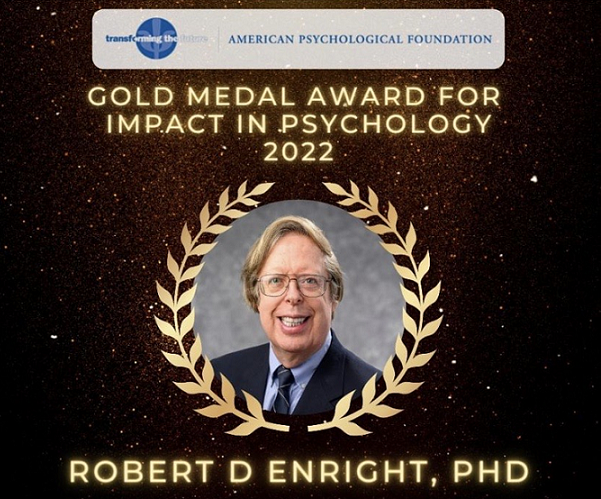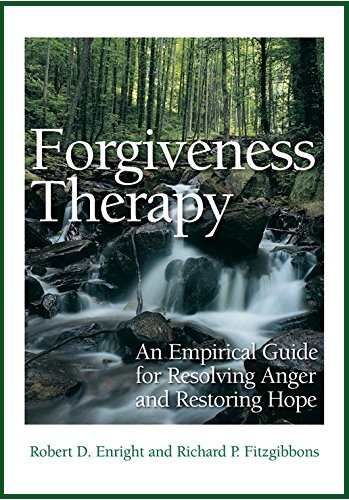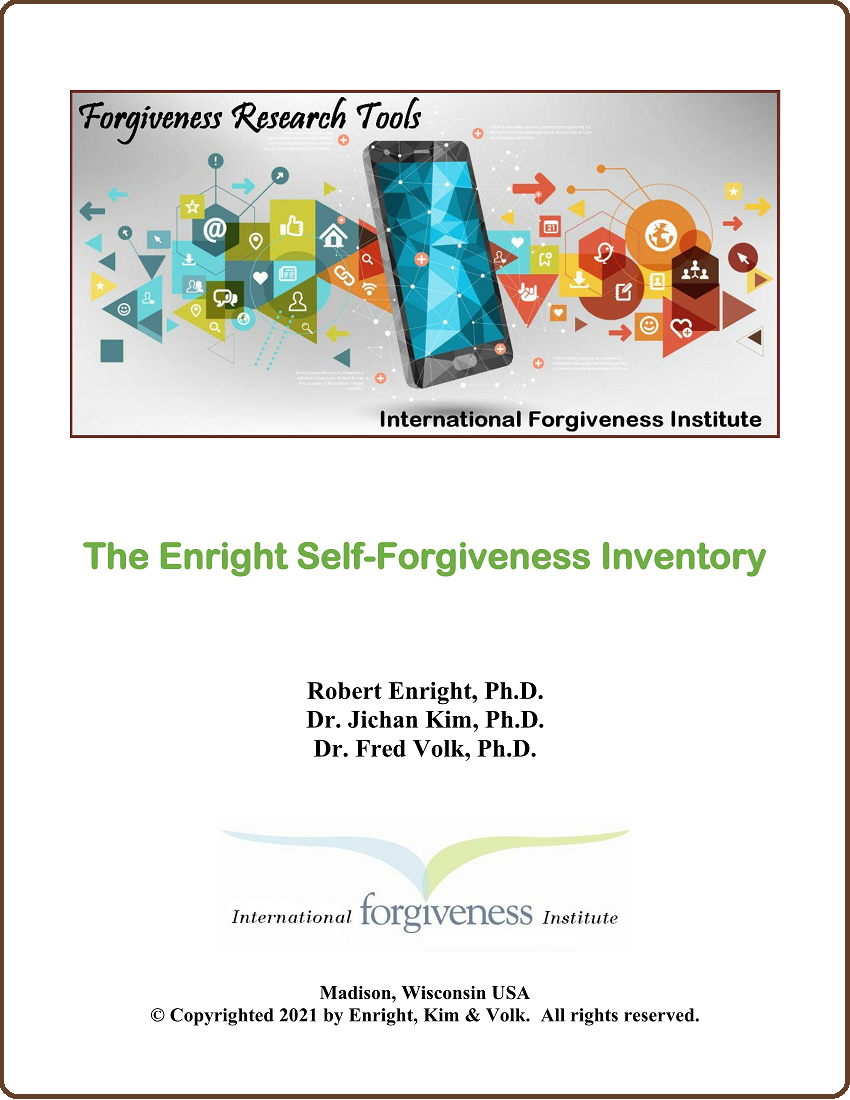Tagged: “Research Tools”
Forgiveness Research Goes Viral
Surging world-wide interest in the virtue of forgiveness was vividly demonstrated this week when the International Forgiveness Institute (IFI) released updated distribution totals for its prized Forgiveness Research Tools.
In just the past 17 months, the IFI has fulfilled requests for 717 copies of its Forgiveness Research Tools–requests received from individuals and research organizations in 41 countries and 43 US states plus the District of Columbia. The IFI began offering the tools for free on April 1, 2021.
The forgiveness tools were developed by IFI co-founder![]() Dr. Robert Enright and his associates through the Enright Forgiveness Lab that he established at the University of Wisconsin-Madison. Dr. Enright has validated those scientific measuring tools and used them in more than 50 forgiveness research projects he has conducted at locations around the world since 1993.
Dr. Robert Enright and his associates through the Enright Forgiveness Lab that he established at the University of Wisconsin-Madison. Dr. Enright has validated those scientific measuring tools and used them in more than 50 forgiveness research projects he has conducted at locations around the world since 1993.
By far the most popular and most requested forgiveness tool (223 requests) is the Enright
Self-Forgiveness Inventory (ESFI) that “captures the Aristotelian view of forgiveness as a moral virtue practiced toward the self.” According to Dr. Enright, the tool is based on the premise that “self-forgiveness is a moral virtue, not a psychological technique.”
Close behind in requests (201) is the Enright Forgiveness Inventory-30 (EFI-30)—a shortened version of the Enright Forgiveness Inventory for Adults that has become the interpersonal forgiveness measure tool of choice for research professionals since its development in 1995.
Two other forgiveness tools developed by Dr. Enright are also extremely popular:
- The Enright Forgiveness Inventory for Children—an objective measure of the degree to which one person forgives another who has hurt him or her deeply and unfairly (125 requests); and,
- The Enright Group Forgiveness Inventory—a newly-developed research tool that takes forgiveness from its traditional focus on individuals to a higher magnitude by concentrating on group forgiveness—an area of intervention that has dramatic implications for its ability to enhance peace efforts in the world (109 requests).
Dr. Enright is a licensed psychologist and an educational psychology professor at UW-Madison who pioneered the scientific study of forgiveness. He wrote the first scientific journal article on person-to-person forgiveness, is often introduced as “the father of forgiveness research,” and has been labeled “the forgiveness trailblazer” by Time magazine.
 In 2019, Dr. Enright received the international Expanded Reason Award from the Universidad Francisco de Vitoria and the Vatican Foundation Joseph Ratzinger/Benedict XVI and he holds the Aristotelian Professorship in Forgiveness Science (2020) from UW-Madison. Earlier this year he was awarded the 2022 American Psychological Foundation Gold Medal Award for Impact in Psychology. His work integrates psychology, philosophy, and psychotherapeutic disciplines.
In 2019, Dr. Enright received the international Expanded Reason Award from the Universidad Francisco de Vitoria and the Vatican Foundation Joseph Ratzinger/Benedict XVI and he holds the Aristotelian Professorship in Forgiveness Science (2020) from UW-Madison. Earlier this year he was awarded the 2022 American Psychological Foundation Gold Medal Award for Impact in Psychology. His work integrates psychology, philosophy, and psychotherapeutic disciplines.
Dr. Enright’s 37-year quest to harness what he calls “the power of forgiveness” has resulted in the development of curriculum guides for students at each level from pre-kindergarten through 12th grade that are now being used in more than 30 countries around the world.
His groundbreaking clinical manual Forgiveness Therapy, developed with psychiatrist Dr. Richard Fitzgibbons through the American Psychological Association, is the basis for the world’s first online forgiveness education course for psychologists, social workers, nurses, and other professional counselors. It is offered exclusively through the IFI.
developed with psychiatrist Dr. Richard Fitzgibbons through the American Psychological Association, is the basis for the world’s first online forgiveness education course for psychologists, social workers, nurses, and other professional counselors. It is offered exclusively through the IFI.
“When I first began exploring the virtue of forgiveness, I was unable to find a single scientific journal article on forgiveness that had been published anywhere in the world,” Dr. Enright recalls. “Today there are literally hundreds of such articles and based on the demand for our research tools, that number will soon be growing exponentially.”
Dr. Enright’s forgiveness research tools are available free upon request at the International Forgiveness Institute website: internationalforgiveness.com or via email: director@internationalforgiveness.com.
The Dark Side of Saying that Self-Forgiveness Has a Dark Side
A recent study by Peetz, Davydenko, and Wohl (2021) concludes that there is a “dark side” to self-forgiveness. They, in fact, use this term three different times in the journal article. The point of this blog is to challenge their view and to show that the statement is an over-reaction to their data.
Here is what they did in the study: They asked people who were entering a grocery store to fill out a self-forgiveness scale specifically regarding over-spending in the past and a scale that assesses beliefs about whether people can change their abilities or not. For the latter variable, the researchers were interested, for example, in whether participants believed they could or could not change their spending habits if they overspent.
Those who believe that people, including themselves, can change unwanted habits are called incrementalists. This issue of incrementalism is important in this research because the authors were hypothesizing that if people think that they cannot change their behavior of over-spending (they are not incrementalists), then they likely will be more cautious in how they spend relative to the incrementalists who might take the cavalier attitude that “I can always change bad behavior.”
So, the expectation in the research was this: Those who over-spent in the past and who now have forgiven themselves, and who think they can change, will have problematic spending on this new shopping venture. This is what the authors called—three times—the “dark side” of self-forgiveness.
So, then, what did they find? In Study 1, with over 100 participants, the statistical results were not significant. The findings approached significance in that those who forgave themselves and who are incrementalists (believing that they can change and so over-spending should not be that big of a deal) tended to spend more, but again it was not statistically significant.
In Study 2, they did a larger study with over 200 participants and found the exact same thing. There was no statistical significance for self-forgivers, who are incrementalists, to over-spend.
Upon their third try, they looked at spending relative to what was the pre-determined budget prior to shopping. Here they did find that those who self-forgave for over-spending in the past and who were incrementalists (thinking they could change and so the over-spending probably is not a big deal) did spend more than those who kept themselves in check because they were not incrementalists (in other words, they did not trust themselves to change spending habits as much as people with the incremental beliefs that they could change).
Yet, here is the bottom-line critique of this work: The authors never assessed: 1) whether or not the participants who spent more than they had planned had way-overdone the spending; 2) whether or not the spending was harmful to their budget or to the family’s budget; and 3) whether or not any true economic injustice was done by the purchase.
The average reported total amount spent by participants in Study 2 was $74.06. For the majority of people, this hardly would destroy the family finances. In other words, was this kind of spending harmful? Self-forgiveness takes place in the context of harm, of unjust treatment, often toward others, and is seen by the self-forgiver as unjust. Was this kind of spending in this study unjust? The authors did not ask the participants if they thought this was the case.
So, in the final analysis, we see that in one of three statistical tries, participants, who formerly have self-forgiven for over-spending and who think they can change their behavior, spend perhaps a little more than those who think they cannot change. How big is this difference and how serious is it for the family? Given the statistical failure in two out of three tries and given the small sum spent on the average ($74.06), it seems to me that calling this a “dark side” of self-forgiveness is not warranted, at least for now. Do you see how there is a “dark side” to exaggerating conclusions about the dark side of forgiveness?
Robert Peetz, J., Davydenko, M., & Wohl, M. J. A. (2021). The cost of self-forgiveness: Incremental theorists spend more money after forgiving the self for past overspending. Personality and Individual Differences, 179, 110902.
Agape Love: “A Sense of Joy in the Giving”
The first phase of a multi-million-dollar, multi-year forgiveness research project in three culturally distinct regions of the world is providing clarity to an ancient concept that researchers say could bring psychological health to individuals as well as peace and unity to families, communities, and countries.
“Agape love is an under-researched concept that has significant implications for harmonious relationships and good mental health,” according to forgiveness pioneer Dr. Robert Enright, an educational psychology professor at the University of Wisconsin-Madison and co-founder of the International Forgiveness Institute (IFI). “The goal of this project is to define what agape love is and is not, and to develop accurate measures of agape so we can assess the degree to which a person understands and practices it.”
That 3-year research project is focused on incorporating agape love fundamentals with Dr. Enright’s Forgiveness Education Curriculum materials for grade school students. Working with 60 teachers and up to 1,200 elementary students in Northern Ireland, Israel (both Arabic- and Hebrew-speaking schools), and Taiwan, the research is being funded by the John Templeton Foundation which has been supporting research on forgiveness for more than 20 years.
Agape love is a concept found in at least eight world religions and dates back to the work of three Greek philosophers:
- Socrates (470 BC – 399 BC), who was among the first moral philosophers to espouse the theory of virtue ethics;
- Plato (428 BC – 347 BC), a student of Socrates who is the namesake of Platonic love; and,
- Aristotle (384 BC – 322 BC), a student of Plato, who is called “the father of psychology.”
The influence of those three philosophers continued well into the 19th century, helped shape much of Western moral philosophy, and gained renewed interest with the modern advent of virtue ethics in the late 1950s. This “Aristotelian philosophical view of virtue ethics” was used by Dr. Enright’s initial research team (composed of UW-Madison and IFI researchers) to develop its definition of agape love:
“Agape love is a moral virtue in which a person willingly and unconditionally offers goodness, at a cost to the giver, to another or others in need.”
To further explain, the team added:
“There is a giving of the self to the other(s) that is: a) understood, b) motivated c) willed, and d) acted upon toward other people in such a way that the actions cost the one expressing that love. Because so much is given in agape, it follows that something is taken away from the one who engages in this form of love and such taking away might be needed energy, needed material possessions, needed comfort, and/or even needed safety. Yet, there is a paradox to agape: In the giving, there is psychological gain for the giver, including a sense of joy in the giving.”
That definition was the key element in the research team’s initial report called “The Philosophy and Social Science of Agape Love.” It was published this month in the latest issue of the Journal of Theoretical and Philosophical Psychology, a quarterly publication of the American Psychological Association (APA).
In addition to examining the true meaning of agape love, the research report explores the characteristics of a moral virtue and delineates both the commonalities and significant differences between agape and other forms of love. It also provides an in-depth critique of existing social scientific love scales in preparation for a phase-two activity that will result in the development of a specific psychological agape love scale that is statistically reliable and valid and that has cross-cultural validity.
“Agape love is worth studying because, as a moral virtue, it challenges people to strive for betterment in their humanity,” the report concludes. “Agape requires heroic commitment to the betterment of others. As such, agape may aid humanity in reaching its highest level when people begin to deliberately, consciously, and willingly cultivate this moral virtue.”
The content of the agape and forgiveness  curriculum across the three world zones will be described by the teachers themselves during the International Educational Conference on Agape Love and Forgiveness being held at the University of Wisconsin-Madison campus on July 19-20, 2022. Additional information about agape love and the conference is available at the Agape Love and Forgiveness website.
curriculum across the three world zones will be described by the teachers themselves during the International Educational Conference on Agape Love and Forgiveness being held at the University of Wisconsin-Madison campus on July 19-20, 2022. Additional information about agape love and the conference is available at the Agape Love and Forgiveness website.
Your Help Is Needed: New Research Project – You Could Win Cash or a Gift Card
You are invited to participate in a voluntary, confidential, first-of-its-kind research study about your driving behaviors and attitudes toward those who have deeply hurt you in the past and your current emotional state. Participation simply involves the completion of a number of simple-to-answer survey questionnaires.
“Those who participate in this study will be part of a select group whose survey answers will help us construct study data and develop interventions,” according to Jacqueline Song, Principal Researcher for the International Forgiveness Institute (IFI). “This project is likely to have life-saving implications that will stretch around the world but we need help to accomplish that.”
You are eligible to participate in the study if you can answer “Yes” to these five questions:
- Are you age 21 or older?
- Are you a resident of either the United States or the metro Manila area of the Philippines?
- Do you have a valid driver’s license?
- Can you read and understand English?
- Do you have Internet access in order to complete the online surveys?
If you answered “Yes” to those questions, you can be one of our select participants and you could win a cash prize or a gift card.
Join us today! Click one of these links:

Six Reasons Why You Should Participate in This Research Project
- US participants who complete the survey will be entered in a random drawing to win one of ten Amazon Gift Cards ($20 value each); Filipinos who complete the survey will be entered to win one of 20 cash prizes of 500 Philippine pesos.
- You will have an opportunity to participate, at no cost and only if you choose to, in the interventions that are developed as a result of the research data acquired.
- You will receive our immense appreciation for helping us help others.
- You will acquire the self-satisfaction of demonstrating your compassion and willingness to help others around the world.
- You will be a participant in a life-changing project designed to improve the human condition.
- You will have an opportunity to spend some valuable time reflecting on your thoughts and feelings about yourself and others.
Final notes from the Principal Researcher:
- One of the survey questions asks you to share a personal experience of a deeply unjust event or pattern of unfavorable events that happened to you in the past;
- We expect that most participants will be able to complete the online survey in 60-90 minutes;
- To avoid distractions, we discourage use of a mobile phone to answer the online survey questions; and,
- Please share this invitation with others who meet the criteria listed above.
Forgiveness Research Tools Flying Out the Door and Around the World
When The Christian Science Monitor called him “the father of forgiveness research” nearly 20 years ago (Dec. 19, 2002), Dr. Robert Enright, a University of Wisconsin-Madison educational psychology professor, had just completed what the news organization called “the first study ever to show a cause-and-effect finding regarding physical health. . . and forgiveness.”
Today, as Dr. Enright nudges close to 37 years of forgiveness study and interventions, his research tools and techniques have become the preferred instruments of social scientists and researchers around the world. To stimulate even further growth in the burgeoning field, the forgiveness pioneer is giving his research tools away at no cost and with no strings attached.
On April 20 of this year, Dr. Enright announced that the non-profit educational organization he founded–the International Forgiveness Institute (IFI)–would provide his highly regarded scientific research tools absolutely free to any forgiveness researcher who requested them. In just the four months since then, the IFI has received and fulfilled orders for 252 copies of his individual tool documents from researchers in 21 foreign countries and 27 US states.
The free research tools available from the IFI and the number of copies distributed since April include:
- The Enright Self-Forgiveness Inventory (ESFI) – 76 Requests
This measure is based on the conceptualization of forgiveness as a moral virtue. The ESFI is a 30-item scale featuring six subscales with five items each. Five additional items at the end of the scale allow for measurement of Pseudo Self-Forgiveness (PSF). Although several competing self-forgiveness measures exist, Dr. Enright’s is the only one that captures the idea that self-forgiveness is a moral virtue that includes behavior toward the self.
- The Enright Forgiveness Inventory-30 (EFI-30) – 85 Requests
This tool is a shorter version of the Enright Forgiveness Inventory for Adults that has become the interpersonal forgiveness measure of choice for research professionals in the U.S. and abroad since its development in 1995. The EFI-30 reduces the number of items from 60 to 30 for the purpose of a more practical assessment of this construct. Data from the United States were used in the creation of the new measure and applied to seven nations: Austria, Brazil, Israel, Korea, Norway, Pakistan, and Taiwan to develop its psychometric validation.
- The Enright Group Forgiveness Inventory (EGFI) – 44 Requests
The EGFI has 56 items across seven subscales with each subscale having eight items. Those subscales measure a group’s motivation and values regarding forgiveness, peace, and friendliness toward the other group. The instrument is a valuable tool that could enhance peace efforts in the world. The EGFI was validated and published earlier this year by Dr. Enright and a team of 16 international researchers who collected data from 595 study participants in three different geographic and cultural settings of the world—China and Taiwan, Slovenia, and the US.
- The Enright Forgiveness Inventory for Children (EFI-C) – 47 Requests
The EFI-C is an objective measure of the degree to which a child forgives another who has hurt him or her deeply and unfairly. It is a 30-item scale similar to the 60-item adult version and is presented orally to very young children and in writing to those who can read well. Thanks to a researcher in Pakistan, the EFI-C is now available in the Urdu language—the native language of an estimated 230 million people, primarily in South Asia.
“Making these tools available to researchers at no cost is one way to grow the repository of forgiveness knowledge,” Dr. Enright explained. “This area of moral development has produced significant advancements in the areas of education, medical treatment, and therapy, so why not encourage others to help expand that information base?”
“There’s no getting around it – forgiveness is good for you and holding a grudge is not.”
-The Christian Science Monitor
- Learn more and order Dr. Enright’s free tools on the Forgiveness Research Tools page.
- Read how the EFI-30 was tested and validated in 8 countries around the world.
- Read the entire forgiveness article in The Christian Science Monitor.



